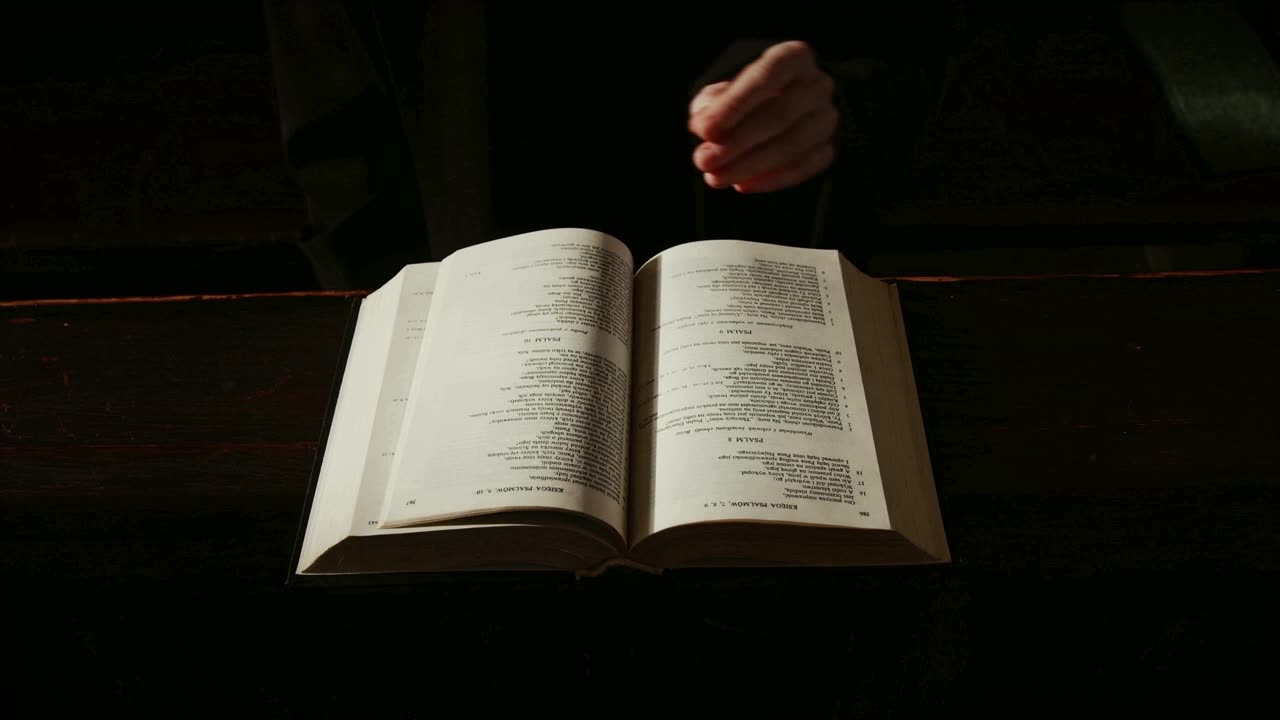Premium Only Content

Question about REVELATION?
Let’s turn in our Bibles to the book of Revelation. We are beginning with our study tonight an examination of the great truths of this marvelous book. As I began my study some time back, I was contemplating how I might be able to introduce the book. I thought of perhaps going back and beginning with some notes taken from the book of Ezekiel or perhaps some notes taken from the book of Daniel or perhaps some anticipatory teaching from the book of Zechariah, all of which touch in one way or another on this great book. I thought about going back and beginning maybe in the Olivet discourse of our Lord; that is, His discussion of His own second coming in Matthew 24 and 25, also in Luke’s gospel.
And then I thought of perhaps looking into the epistles of Paul or into the epistles of Peter for there are many places where themes related to the second coming of Jesus Christ are dealt with. But after all of that consideration, as I began to read over the first chapter and just read it and reread it and meditate on it, I realized that for me to concoct an introduction, even though it be an Old Testament one or a New Testament one, would somehow be to step, as it were, on the territory which John had reserved for his own introduction.
And as I began to read and think about the beginning of this book, it became very obvious to me that verses 1 to 3 is in fact John’s own Holy-Spirit-inspired introduction to this monumental work, and I realized that I don’t need to introduce this study because John has done that, and the first three verses do it perfectly.
Let’s look at them. Revelation, chapter 1, verses 1 through 3: “The revelation of Jesus Christ, which God gave Him to show to His bondservants the things which must shortly take place; and He sent and communicated it by His angel to His bondservant John, who bore witness to the Word of God and to the testimony of Jesus Christ, even to all that he saw. Blessed is he who reads and those who hear the words of the prophecy, and heed the things which are written in it, for the time is near.”
And then in verse 4, he really begins to write when he says, “John, to the seven churches.” But before that letter, which begins in verse 4, is this wonderful introduction in the first three verses. And as I began to study these three verses, it became apparent to me that everything we need to prepare us for the unforgettable and life-transforming experience we’re going to have in Revelation is tucked into those three verses someplace. And so what I want to do to help us with our orientation - and it’s very important, it’s very essential - is to look into those three verses and see the components of that introduction, which put us in touch with the great matters and the great issues of this book.
Now, in order to do that, I want to break the introduction down into several components and share them with you one at a time. And as we look at them, they will introduce us to this wonderfully rich book. First of all, in his introduction, John speaks with regard to the book of Revelation of its essential nature - its essential nature. Verse 1 says, “The revelation.” Now, we have to stop there. I knew you knew I’d do that, but we have to do that. The nature of this book is that it is a revelation. It is the revelation. This is the key to everything that follows. Here are truths that have been concealed and are now revealed.
There are truths in the book of Revelation that were carried on the back of symbols, carried on the back of figures of speech in the Old Testament. There are truths in the book of Revelation that were veiled in prophetic language in the Old Testament. Though there are no - I’ll say it again - there are no direct quotes from the Old Testament in this entire book. There are no direct quotes out of 404 verses. There are no less than 275 of them that have some reference to or connection with Old Testament prophetic truth. The relationships are not in terms of quotations but in terms of connections and references rather than direct quotations.
It is a book that is filled with the unveiling of that which was only initially suggested in the Old Testament. Furthermore, it is obvious to any reader of the book of Revelation that John must have had in his own mind, as he wrote under the inspiration of the Holy Spirit, the teaching of Jesus in the Olivet discourse of Matthew 24 and 25. As we shall see, moving through the book, there are many, many parallels to the teaching of our Lord in that great discourse, which is recorded in Matthew 24 and 25. So much has been revealed about the return of Christ, in the Old Testament and in the New Testament, through the teaching of the Lord Jesus Himself.
It is also true that Paul had much to say about the coming of Christ, both in the rapture of the church and then in the judgment that He would bring upon the ungodly. It is also important to note that Peter had much to say about the coming of Christ in his epistles as he looks forward to that great event. It must also be noted that even in the epistles of John, there is anticipation of the return of Christ. It is also true in the epistle of James that he tells the believer to be patient and endure until the coming of the Lord. So there has been much said about it.
And again, I say, some of it in figures and some of it in symbols and some of it in veiled prophecies and generalizations in prophetic literature of the Old Testament, some of it very specific also, and then again in the New Testament. But here in Revelation, there is an explosion of detail about the return of Jesus Christ. And so this is the revelation; this is the revealing. The word is apokalupsis, from which we get the word apocalypse. That means literally to take the cover off. To take the cover off, to uncover, to unveil, to reveal. That word is used eighteen times in the New Testament. And when it is used of a person, it always indicates that he becomes visible. Whenever that word is used of a person, it means that person becomes visible. And so what you have here is truth becoming clearly visible.
The word apokalupsis is first used in Luke 2, and I need to just show it to you so you’ll get a feeling for how it is used because that needs to be in your mind as you think about it in relation to the book of Revelation. In Luke chapter 2 and verse 28, we have here the parents of the Lord bringing Him into the temple, the baby Jesus, where He is met by a man named Simeon, verse 25 says, “a righteous, devout man looking for the consolation of Israel” - looking for the Messiah - “the Holy Spirit was on him.”
And he takes the baby - in verse 28 - into his arms, and with the baby Jesus in his arms, he blessed God and said, “Now, Lord, thou dost let thy bondservant depart in peace, according to thy Word.” That is, I can die now, I’ve seen the Messiah. “For my eyes have seen thy salvation, which thou hast prepared in the presence of all peoples, a light of revelation to the gentiles and the glory of thy people, Israel.” There is the word apocalypse, a light of apokalupsis, an unveiling, an uncovering. Literally, in this case, a person made visible. Now the Messiah, the Christ, the Savior has been made visible, and it speaks of the shining forth of a person.
In 1 Peter 1:7, the word is translated appearing. In 1 Corinthians 1:7, it is translated coming or arrival. In Romans 8:19, manifestation. So it means all those: an unveiling, an uncovering, someone made visible, the shining forth of a person for all to see, the appearing, the arrival, the manifestation. That is its essence. Now, there is truth in the statement that all Scripture is revelation, that is true, but in a very special way, this book is the revelation. It is the revelation - notice it - of Jesus Christ. It reveals Jesus Christ shining forth. Here we see the blazing glory of Christ revealed.
Now, many people assume - and I need to comment on this - that this book hides things. People read this book and are absolutely confused by it. People read it and assume that it is some kind of mysterious, strange, exotic, unsolvable riddle, some puzzle that man could never understand. They assume it is vague or obscure or complex or incomprehensible and confusing. But this book is not the hiding; this book is the revelation. Important to note that. It is not the covering; it is the uncovering.
And what does it reveal? What does it uncover? Well, many things, many things. As we look at this book, we will find that it reveals warnings to the church about its besetting sins. It reveals instruction to the church about the need for holiness. It reveals the amazing power and glorious overcoming strength of Christ and the Christian over sin and Satan. It reveals the ultimate triumph of believers who are killed for the cause of Christ. It reveals the glory of worship. It reveals the end of human history. It reveals the final political setup of the world. It reveals the triumph of God’s saving purpose.
It reveals the career of antichrist and the final battle of Armageddon and the alignment of the nations of the world. It reveals the need to fight the forces of evil patiently. It reveals the glories of Christ’s Kingdom on earth and in the new heaven and the new earth. It reveals the triumph ultimately of God’s saving purposes, no matter what Satan endeavors to do. It reveals the victory of Christ over all powers, human and demonic. It reveals the final end of Satan and the final end of sin.
It is the opposite of a puzzle, it is the opposite of a mystery, it is not a covering, it is not a hiding - it is an unveiling. And so we say its essential nature is that it is the revelation, and that word is chosen very carefully by John. It is the apocalypse, the unveiling, the disclosure of details heretofore hidden from human view. The history of the end of the universe and how it will take place and what will come after that. In fact, the best way to say it is it is a front-page story of the future of the world written by someone who was there - who was there. If I could title the study of Revelation in a contemporary concept, I would title it, “Back to the Future.” So that is its essential nature, it is revelation.
Second point that I want you to note as we consider John’s introduction is its central theme - its central theme. It is the revelation of Jesus Christ. I am halted as I go through this by every term because they’re so literally filled with meaning. It is the revelation of Jesus Christ. Now, some people think that that means the book is from Jesus Christ. Well, that certainly in a sense is true. In Revelation 22:16, the last chapter: “I, Jesus, have sent my angel to testify to you these things for the churches.”
It is true that this revelation comes from God and certainly from Jesus Christ. But it is not best to understand John’s statement in that regard. It is not so much the revelation from Jesus Christ as it is the revelation about Jesus Christ. It is Christ who is unveiled here. It doesn’t really take very long. In fact, as soon as you get into verses 4, 5, and 6, Christ begins to be unveiled. And then you get into 7 and 8 and you see Him in all His blazing glory. And then you get Him in chapter 2 and 3 as He scrutinizes His church.
And then in chapter 4 through 22, the whole theme of it is the unveiling of the glory of Christ in His second coming, as He takes back the earth from the usurper, Satan, and establishes His Kingdom, both the Kingdom in this world and the Kingdom in the world to come. It is Christ who is unveiled. It is Christ who is manifest. It is Christ who is uncovered. It is Christ presented in glory, Christ presented in majesty. Now, in that sense, perhaps you’ll understand what I mean if I tell you it is very much like the gospels, Matthew, Mark, Luke, and John, only in this great distinction: the gospels unveiled Christ in His first coming in humiliation; the book of Revelation unveils Christ in His second coming in exaltation.
The theme of Matthew, Mark, Luke, and John is Jesus Christ in His humiliation. The theme of Revelation is Jesus Christ in His exaltation. But He is the theme. This is the apocalypse. It is the apokalupsis Iēsou Christou. It is the unveiling of Jesus Christ. By the way, that phrase is used other places in the New Testament. In 1 Corinthians chapter 1, verse 7, says we are awaiting eagerly the apokalupsis Iēsou Christou, the apocalypse, the unveiling of Jesus Christ. In 2 Thessalonians chapter 1 and verse 7, it says, “The Lord Jesus Christ shall be revealed.” There is that same phrase, the apokalupsis Iesou Christou.
We find it there in that same text, 2 Thessalonians chapter 1. Peter even uses the same phrase, 1 Peter 1:7. He says we will be found in praise and glory and honor at the apokalupsis Iēsou Christou, the coming of Jesus Christ. The same words appear in one other text and I want you to look at it. Galatians chapter 1. Galatians chapter 1, and here, I think, is a very important note so that we don’t misunderstand its meaning. In Galatians chapter 1, Paul is talking about he now preaches the gospel. And in verse 11, he says, “I would have you know, brethren, the gospel which was preached by me is not according to man.” It’s not according to man.
He said, “I didn’t get my message from a human source.” Verse 12, “For I neither received it from man, nor was I taught it, but I received it through an apokalupsis Iēsou Christou.” And he means here not a revelation from Christ, but a revelation of Jesus Christ. In other words, “I got my gospel when God delivered to me the truth about Christ.”
To see that’s what he means, you only need to read further. Verse 13, “For you have heard of my former manner of life in Judaism, how I used to persecute the church of God beyond measure and tried to destroy it. I was advancing in Judaism beyond many of my contemporaries, among my countrymen, being more extremely zealous for my ancestral traditions. But when He who had set me apart, even from my mother’s womb, and called me through His grace” - that is God - “was pleased to reveal His Son in me, that I might preach Him among the gentiles, I didn’t immediately consult with flesh and blood,” and so forth.
He says, “I received a revelation of Jesus Christ from the God who called me through His grace and was pleased to reveal His Son.” So each of these uses of this same phrase, apokalupsis Iēsou Christou, are consistent with the idea that it is a revelation about Jesus Christ, not a revelation from Jesus Christ, that the writer has in mind. Now back to the book of Revelation. What he is saying here is that Jesus Christ is the great central theme of this book, which closes the Bible.
One of my favorite preachers on the book of Revelation is W. A. Criswell, for many years the very honored pastor of the First Baptist Church of Dallas, Texas, where I have preached on several occasions, much to my own delight and blessing. In commenting on the book of Revelation he said this: “The first time our Lord came into this world, He came in the veil of our flesh. His deity was covered over with His manhood. His godhood was hidden by His humanity. Just once in a while did His deity shine through, as on the Mount of Transfiguration or as in His miraculous works.
“But most of the time, the glory, the majesty, the deity, the wonder, and the marvel of the Son of God, the second person of the Holy Trinity, were veiled. These attributes were covered over in flesh. He was born in a stable. He grew up in poverty. He knew what it was to hunger and to thirst. He was buffeted and beaten and bruised. He was crucified and raised up as a felon before the scoffing gaze of the whole earth. The last time this world saw Jesus was when it saw Him hanging in shame, misery, and anguish upon the cross. He later appeared to a few of His believing disciples.
“But the last time that this unbelieving world ever saw Jesus was when it saw Him die as a malefactor, as a criminal, crucified on a Roman cross. That was a part of the plan of God, a part of the immeasurable, illimitable grace and love of our Lord. ‘By His stripes we are healed.’”
Then he says this: “But then is that all the world is ever to see of our Savior, dying in shame on a cross? No. It is also a part of the plan of God that someday this unbelieving, this blasphemous, this godless world shall see the Son of God in His full character, in glory, in majesty, in the full-orbed wonder and marvel of His godhead. Then all men shall look upon Him as He really is. They shall see Him holding in His hands the title deed to the universe, holding in His hands the authority of all creation in the universe above us, in the universe around us, and in the universe beneath us; holding this world and its destiny in His pierced and loving hands.” End quote.
Once you traverse this book, it will become apparent that you are seeing the main central theme is Jesus Christ. In fact, our blessed Lord Jesus Christ appears in seven chief images. He is the risen glorified Son of God among the churches. He is the Lamb in heaven, publicly invested with authority to carry out the determined preliminary judgments on men. He comes to earth as the King of kings and Lord of lords. Fourthly, He is Christ. Fifthly, He is the judge on the great white throne. Sixthly, He is the Lamb upon the throne of God and of the Lamb. Seventh, He is I, Jesus, the root and offspring of David, the bright and morning star.
And lest you think there are only seven times in this book when He is spoken of, I will give you a list of other titles that He bears. In this book, He is the faithful witness, He is the firstborn from the dead, He is the ruler over the kings of the earth, He is the alpha and omega, He is the beginning and the end, He is the One who is and who was and who is to come, He is the Almighty, He is the first and last, He is the Son of man, He is He who lives, He who holds the seven stars in His right hand, who walks amidst the seven golden lampstands, He who has the sharp two-edged sword, He is Son of God, He is He who has eyes like a flame of fire and feet like fine brass.
He is He who has the seven spirits of God and the seven stars, He is He who is holy, He who is true, He who has the key of David, He who is the amen, the faithful and true witness, the beginning of the creation of God, the lion of the tribe of Judah, the Lord holy and true, the Lord God almighty, the King of the saints and the Word of God. All of that in this book. He is the center of the book and He is the circumference of the book. He is the beginning and the end. He is the top and the bottom. He’s the inside and the outside. He is the over and the under.
The heavens are opened in this book, and you are going to see a vision of Jesus Christ, not in humility, not in human form. You are going to see a vision of Jesus Christ in His sovereign majesty and eternal glory, and it will flash before your eyes over a prolonged period of time as it did for a split second in the vision of Stephen. You remember that? He saw the Son of God in heaven when he was dying as a martyr in Acts 7:56. What flashed across His eyes in a moment shall be prolonged in your vision as we go from chapter 1 to chapter 22. Jesus Christ, always seen in majestic glory, never in humiliation.
The essential nature of the book? It is an unveiling, an uncovering of things heretofore not known, details of the end of the universe and the coming of Christ. The central theme? Jesus Christ. Look back at verse 1, let’s go further: “The revelation of Jesus Christ which God gave Him.” That leads me to discuss the divine source, the divine source of this book. Who is the divine source? God, “which God gave Him.” This is a wonderful aspect of this book, by the way. Let me ask you a question - this is what struck me, “which God gave Him.” You’ll notice it’s capitalized in your Bible. It’s referring back to the antecedent, Jesus Christ.
What that says is - now listen to this - God gave this book to whom? To Jesus Christ. That’s an interesting thought, isn’t it? And I suppose you could ask yourself the question that I asked myself: What does Christ need God to give Him? Well, there have been some interesting suggestions about that. Some people say - well, let’s go back to Mark 13:32 - you don’t have to turn to it, you’ll remember it as soon as I read it.
Mark 13:32 says these familiar words - and you remember this is a startling statement coming from Jesus, “But of that day or hour” - that is, of the return of the Son of man. “But of that day or hour no one knows, not even the angels in heaven, nor the Son, but the Father alone.” Remember that? And many times we’ve asked how is it that Jesus, if He is God, doesn’t know that? How is it that He doesn’t know the time of His return? “The angels don’t know,” He said, “and I don’t know. Only the Father knows.” But that’s what He said.
In His humiliation, when He came as a servant into this world and humbled Himself and took on the form of a man and restricted the free exercise of His attributes, He limited His own knowledge. And when He said, “I don’t know,” that’s exactly what He meant. Some have suggested, then, that the reason it says here, “the revelation of Jesus Christ which God gave Him,” was to give Him the information that He up to this point didn’t know. In other words, God is saying, “I am now going to tell you what you haven’t up to this moment known. In your self-limiting condescension, you didn’t know the day or the hour. But in this book I’m going to tell you the details of the end.”
That’s an interesting observation, but the facts are this book doesn’t even tell us the exact day or the hour, either. So this really doesn’t answer that question. And I think it would be a fair assumption for us to make that now the Son of God is glorified and back at the right hand of the throne of God, He has entered in to the full exercise of all His attributes, including His omniscience, and He now knows anyway and didn’t have to wait until 96 A.D. when this book was written to find out.
Well, then, in what sense is this book given to Christ? In another sense, a wonderful sense, God made a promise to exalt Jesus Christ. God made a promise that Jesus Christ would be King of kings and Lord of lords, that He would be King of the earth. God made a promise that Jesus Christ would be heir to everything that the Father possesses. And because Jesus humbled Himself and because He became flesh and because He served the Father obediently, perfectly, because He suffered and because He died, God has given to Him this great revelation of the glory to come.
There isn’t the time of His coming in here, that’s not what He’s giving Him, He is giving Him the full disclosure of what will happen in His glorification when He returns. This is His reward for such perfect, humble, faithful, holy service. It would be like a father saying to his son, “You’ve been a good son, you’ve been a wonderful son, you’ve been an obedient son, you’ve been a dutiful son, and in your faithfulness to me as your father, I have promised you that if you were faithful and you did what I asked and you accomplished the goals that I established for you, that I would give you my inheritance.”
And the father then says, “Now, son, here it is, I have it all written up in full and I hand it to you, it is now yours.” In a sense, that is exactly what God has done with the book of Revelation. Beloved, can you handle this? We are eavesdropping on the gift of this book which God the Father gave to His Son. It is for Him. God the source, the primary recipient being Jesus Christ, and it tells the awesome, glorious, wonderful story of what’s going to happen in the future when the obedient Son comes back in full glory.
Think of it this way: The resurrection was the Father’s first - first down payment on the inheritance. The first token, evident token of the inheritance was the resurrection. God raised Him from the dead. The second evident token of the Father’s pleasure was the ascension. He took Him to heaven and sat Him where? At His right hand. The third token of the Father’s pleasure over the Son’s obedience was the sending of the Holy Spirit because the Spirit was sent to indwell the church which Christ redeemed and loved.
And here is the last token, this gift of this book, which outlines in detail the coming glory of Jesus Christ so that not only will He live in full anticipation but all who love Him can enjoy knowing all of this that will come to pass for the purpose that we may praise Him and glorify Him and honor Him in anticipation.
I guess you could sum that whole discussion up with the words of Philippians, chapter 2. It says though Jesus Christ existed in the form of God, He didn’t regard equality with God a thing to be grasped, but emptied Himself, taking the form of a bondservant, and being made in the likeness of men, and being found in appearance as a man, He humbled Himself by becoming obedient to the point of death, even death on a cross. There’s His humiliation. Then immediately in verse 9, “Therefore, God highly exalted Him, and bestowed on Him the name which is above every name” - that is, by the way, the name Lord.
“That at the name of Jesus every knee should bow, of those who are in heaven and on earth and under the earth, and that every tongue should confess that Jesus Christ is Lord, to the glory of God the Father.” Those last three verses, 9, 10, and 11, are played out in detail in the book of Revelation. You were faithful in your humiliation and I will be faithful to fulfill my promise in your glorification. The essential nature of this book? It is the revelation, the uncovering. The central theme of this book? It is the uncovering of Jesus Christ. The divine source of this book? It is God who gave it and who gave it to Christ as a testimony of the future glory which He will enjoy.
And we are really privileged - are we not? - to be able to look at this and see it. Very often, when a father leaves an inheritance to a son and marks it out in the will and lays out everything and how it’s going to be and how it’s precisely to be given to the son, that is a sealed document. That is a document we’re not allowed to look at. Nobody is allowed to look at it. It is sealed. It is put away safely where it can’t be tampered with. How wonderfully true it is, however, that this book has been opened for us. In fact, in chapter 6, we see the title deed of the inheritance unrolled and seven seals are broken, and they’re all unveiled for us to understand.
Now, that takes us to the next point in His introduction. God is the divine author of this revelation of Jesus Christ, which is given to Him. But who are its human recipients? Who are its human recipients? Please note: “The revelation of Jesus Christ which God gave Him to show to His bondservants.” John takes us another step in comprehending this book. It is to be shown to His bondservants. It is not just for Christ to see and understand and anticipate but it is to be shown to us. It wasn’t written for us, God gave it to Him, and He has given us the right to see it.
What’s the word bondservant? Doulos, slaves, that’s what it means. Slaves. Now, may I note something for you here? Here is one clear reason why non-Christians find this book incomprehensible. It was never intended for them. Right? It was to be shown to people who are the willing slaves of Christ. And if He is not your Lord, you wouldn’t be expected to comprehend this. Now, the doulos or the bondslave is different, say, than the hupēretēs or different than the diakonia. The men - there were six different Greek words for servants. This one was a unique slave. When we say bondslave, we’re talking about a slave who served out of love and devotion.
Way back in the Old Testament, the Jews had a custom. If a servant said, “Look, I love you,” to his master, “I love you, I want to serve you. I don’t serve you out of duty, I don’t serve you out of fear, I serve you out of love, I want to be your servant for life out of love,” the master would take that servant over to the doorway where there was a wood frame and he would pull his ear and push it up against a doorway and through the lobe of his ear he would pound an awl. And he would make a hole in his ear. His ear was punched with that hole. And any slave who had his ear punched was making a statement, “I serve out of love, not duty, I am a bondslave, I am bonded willingly to my master.”
And it is only those kinds of people who will understand this book. I never cease to be amazed when I read liberal theological literature about the book of Revelation. It is bizarre. You pick up some liberal book about Revelation sometime, if you can find one in a library. Don’t check it out, just glance through it, it’s not worth the effort. But you’ll find that they are hopelessly lost in a maze which they cannot unscramble. Why? Because the natural man understandeth not the things of God, they are foolishness to him. Neither can he know them because they’re spiritually discerned.
To the unbeliever, to the hypocrite in the church, the book is chaos, the book is confusion. But to the loving, willing slave of Jesus Christ, it is an unveiling, it is an uncovering that makes things very clear. And so I have to say to you at the very outset, if you’re not a Christian, these truths are closed to you. Oh, you may understand the words that I say. And as I go through, if you listen carefully to my explanation, it may make sense to you in terms of the data on the page. But it can never grip your life, it can never become real to you in your heart, you will never comprehend its significance fully and its meaning in terms of its real depth because you’re not a bondslave.
You remember back in Matthew 13 when Jesus was teaching in parables, He said to His own disciples, “I speak to them in parables because while seeing, they do not see, and while hearing they do not hear, nor do they understand.” You may see the page, you may hear the words, but you will not see with spiritual eyes, you will not comprehend. And then He says to His disciples in verse 16, “Blessed are your eyes because they see and your ears because they hear” - because you’re bondslaves. This is a book for Christians, and no one else can understand it.
So it is the revelation of Jesus Christ, from God, given to the Son, which He shows to us. Fifthly - and we’ll stop at this point - its prophetic character - its prophetic character. Verse 1 again, “It is the revelation of Jesus Christ which God gave Him to show to His bondservants” - here it is - “the things which must shortly take place.” Its prophetic character. It is a prophecy about things which must shortly take place. That is a very important phrase. This book differs from all other New Testament books. It does.
The gospels tell us what took place. Right? Jesus came and lived and died and rose and ascended. And while there are references to the future, the theme of the gospels is what happened in the past. The book of Acts follows. What is the book of Acts about? It’s the history of the church. What are the epistles of Paul and James and Peter and John and Jude and the writer of Hebrews? Well, they’re all about explaining the meaning of the death and resurrection of Christ and its application to the life of the church. And so they take the history of the gospels and Acts and move them into the present life of the church and the life of the believer.
And so we could say the first five books of the New Testament are about the past, and the next group of books - 21 of them - are all about the present and how we are to apply the realities of the work of Christ now, and the last book is about the future. This is about the things which must shortly take place. It is a book made up of prophecy about the future. And that is its fascination.
The outline of the future consideration of this book is in verse 19. Look at it. Here’s the outline of the whole book. John is told, “Write” - and here’s what you write - “the things which you have seen, the things which are, and the things which shall take place after these things.” Three things: the things you have seen, past; the things which are, present; the things which shall take place after these things. That’s the outline of the book. Chapter 1 is what John saw. Chapter 2 and 3 is what is. And chapters 4 through 22 is the things which shall take place after these things.
So prophecy starts in chapter 4 and extends all the way through chapter 22. So this is a prophecy book. This is a prophetic book, in the future sense of prophecy. It is prophetic literature. And I need to mention to you a very important note. In all prophetic literature, there’s a two-sided emphasis, okay? Always a two-sided emphasis. There is coming future glory for Christ in which the saints will participate, but there’s always that other side of coming future judgment on the wicked.
And so as we flow through this and we say Jesus Christ is the theme and future glory is the main - the main emphasis, we will also see, running along with the future unveiling of the glory of Christ, the destruction of sin, Satan, demons, and sinners. While it surely predicts with detail the coming glory of Jesus Christ and the way the saints will share in that glory, it also predicts the damnation of sinners.
And so its truths, as John notes in chapter 10, are bittersweet - bittersweet. It is a book of judgment. It is a book of doom. It tells the end of the world, the end of human history, the end of sinners. And the darker side of the picture is never for one moment concealed. It, too, is fully revealed. God is just, as we know. Sin must be punished. Impenitence and rebellion will issue ultimately in misery and defeat, disaster, death, and eternal judgment. This is no sentimental book. It is a serious book. It is a compelling book. It is a heart-wrenching book. It is a disturbing book.
There is no weak tolerance of evil. There is a Lamb who has been slain, but there is the wrath of the Lamb also. There is a river of the water of life, but there is a lake of fire as well. Here we find a God of love who will dwell among men and wipe away all tears and abolish death and abolish sorrow and abolish pain. But before that, He will send His enemies into a place of sorrow and pain and death and tears that is unimaginable. And so there is no hiding of the dark side of the glory of Christ. A brighter day is to come, yes, but there is thunder before the dawn.
And so we will look at the future. It will be back to the future as we go back to this ancient book written in 96 A.D. and see in it the future written by a man who was there. For John the apostle was there, transported by visions - by visions. It is prophecy.
Now, there are some people who don’t think this is true. Liberal theologians say this, they say, “Well, it is a look back.” No, the book of Revelation is a look back, and it describes the events fulfilled in the reign of Nero from 54 to 68 A.D. It describes the time in which Paul and Peter were martyred. Some say, “No, it looks back from the time of Emperor Domitian from 81 to 96 A.D., when all these things recorded occurred.” This is called the preterist view.
You may have heard that word. Praeter is the Latin word for past. People who say, no, there’s nothing prophetic, it’s not supernatural, it’s not the future, it’s just a look back and it’s describing what happened under Nero or describing what happened under Domitian. By the way, that’s absolutely impossible. Absolutely impossible. As we go through the book, it will become apparent that the things described did not happen then. If they did, nobody would be here.
Now, there are other people who say, “No, it actually is a panorama, starting at the time John wrote and just describing all of church history until the second coming.” So there are some who will go into this book and they’ll find the Roman Catholic Church. They’ll find a whole lot of different popes. They’ll find Constantine in here. They’ll find Mohammed in here. They’ll even find the French Revolution in here. They’ll find the Goths. They’ll even find the Jesuits. That’s impossible.
You can’t take this period of events, this massive list of events, and string it out over all of church history because if you read the book of Revelation carefully, most of all of the drama happens in a period of three and a half years, 42 months, 12 hundred and 60 days. It’s impossible to string it out over all of church history. That’s what’s called the historicist view.
There’s a third group that come along and they say, “Well, it doesn’t really speak about real people, it doesn’t speak about real events, it doesn’t speak about real acts or real wars or - it’s just allegorical, it’s just all about spiritual battle and spiritual warfare, and we just need to spiritualize it.” And what that means is you can make it mean absolutely anything you want it to mean. There’s no rules to that game.
Because if it doesn’t mean what it says but it means what you think it says, then what you think it says is the authority. And so what everybody thinks it says would be what it means, and since everybody would think it said something different, it wouldn’t mean anything. That’s called the idealist view. It’s really the idiotic view.
That leaves us with only one other option and that is that it’s future. You say, “Well, why do you believe it talks about the future?” Because it says, “The things which must shortly take place.” And if you read it, it’s obvious that these things haven’t happened. How about massive resurrections? Have they happened? How about - you can check the cemeteries just to be sure. How about holocausts of unheard-of proportions where a third of the entire world is killed? Has that occurred? What about the destruction of the whole human system as we know it and the building of a new a heaven and a new earth? Has that happened? Absurd.
There’s only one way to look at this, and that is that it is future prophecy. So we’re embarking on a revelation of Jesus Christ from God to Christians about the future, the time of the coming of Christ. And as Walter Scott said long ago, “Prophecy annihilates time. Prophecy annihilates time and all intervening circumstances and sets one down on the threshold of accomplishment.” And we’re literally going to get transported back to the future. And we’re just going to land at the end. That’s what we can anticipate.
Now notice that verse again, verse 1, “The things which must shortly take place.” Now, wait a minute. Shortly? When John wrote that, that was two thousand years ago. What does that mean, shortly? You come back next week and find out because I don’t have time to get into it. It is a tremendous, tremendous truth. Let’s pray.
Father, as we have begun this study, already we are filled with excitement, enthusiasm, and anticipation. To be able to see and understand the revelation of Jesus Christ, which you gave to Him, which He now shows to us about the future, is so thrilling.
I pray for every person here that they would have eyes to see and ears to hear and a heart to understand because they are bondservants of Jesus Christ.
Lord, tonight we’ve heard such wonderful testimonies in the waters of baptism, about the joy of knowing Christ, about the blessing of sins forgiven, about the thrill of the hope of heaven. And now, Lord, we can add this, one of the great benedictions, one of the great blessings, one of the great riches of being a Christian is to be able to comprehend truth, to be able to understand the revelation of Jesus Christ which you gave Him to show to us.
What a thrill that the Lord Jesus would open this to us, which was meant for Him, and let us share in its truths so that we know the future before it comes, so that we can read the history before it happens and live in the light of it.
Thank you, Lord, for this great unveiling, and may it enrich us far beyond our wildest expectations so that we might, until Jesus comes, serve you more faithfully. In His precious name we ask, Amen.
-
 6:30
6:30
Xofyerg Reads The Bible
11 months agoUnveiling the Mystery: Where Was Jesus Between His Death and Resurrection?
172 -
 15:12
15:12
Clownfish TV
16 hours agoVideo Games WILL Drop DEI, Too. Just Wait.
5.64K4 -
 15:17
15:17
Melonie Mac
18 hours agoFemale "Pastor" Lectures Trump with Abomination Sermon
5.86K20 -
 11:56
11:56
IsaacButterfield
1 day ago $0.42 earnedYou're Racist If You Don't Marry Your Cousin
4.99K3 -
 8:11
8:11
MichaelBisping
22 hours agoBISPING Reacts: 'Sign me UP!!' Charles Oliveira CALLS OUT Max Holloway for BMF TITLE FIGHT!
11.9K1 -
 12:38
12:38
NC Dirt Hunter
1 day agoIncredible Civil War relic sticking right out of the ground! Metal Detecting an old plantation.
7.69K2 -
 44:36
44:36
TheTapeLibrary
16 hours ago $2.24 earnedThe DARK Truth About the Pollock Family Tragedy
13.2K11 -
 1:11:01
1:11:01
The Charlie Kirk Show
9 hours agoTHOUGHTCRIME Ep. 70 — Seatgate? Best Executive Orders? Panda Express?
117K14 -
 2:04:23
2:04:23
Kim Iversen
13 hours agoINCREDIBLE: Trump RELEASES JFK Files & BANS Central Bank Digital Currency
168K192 -
 1:12:22
1:12:22
Side Scrollers Podcast
16 hours agoThe Real Game Awards: Official Live Stream
107K17